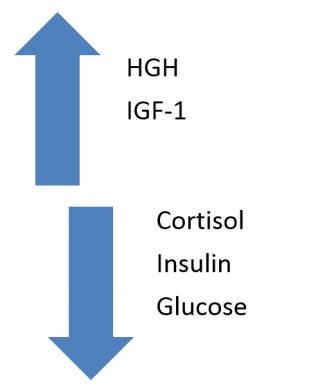
The subject of managing diabetes with human growth hormone is not one you hear much about, yet, perhaps it should be. The amount of HGH in the bloodstream has a direct impact on insulin and glucose levels. Higher human growth hormones equate to an increase in insulin growth factor 1. When both these hormones are high, the levels of cortisol, insulin, and glucose decrease.
There are two distinct types of diabetes. HGH use depends on which type is diagnosed and how well it can benefit the body. Hormone specialists do not prescribe HGH therapy solely as a diabetes treatment. If your body is not deficient in human growth hormone, then HGH therapy will not provide any desirable results.
HGH can not cure diabetes
For some adults who do receive supplemental HGH, diabetes treatment may be decreased down the road or stopped altogether. This is sometimes seen with type 2 diabetes as it helps lower insulin levels and improves glucose uptake by the tissues. No person should stop diabetes treatment without doctor approval. The hormone specialist will monitor blood sugar levels while you are undergoing HGH therapy.
If you are wondering can HGH cure diabetes, the answer is no; it is not a magical cure for any disease. What HGH does it return the body to a state of hormonal balance so that it can work towards healing itself.
With any talk about supplementing the body with HGH, diabetes concern is necessary because too much circulating HGH can elevate blood sugar levels.
Human Growth Hormone and Type 1 Diabetes

With type 1 diabetes, the pancreas does not provide enough insulin to support glucose uptake by the body’s tissues. The body converts carbohydrates into glucose (sugar) that provide the energy needed by the muscles to power us through the day. Type 1 diabetes is most often diagnosed in childhood or adolescence.
For people with abnormal levels of HGH, diabetes type 1 is a possible issue. Type 1 diabetes is typically associated with specific abnormalities in the growth hormone-insulin growth factor 1 axis. IGF-1 impacts glucose and protein metabolism.
The HGH effects on diabetes in this situation is a bit of a circular impact. Insulin deficiency lowers the liver’s ability to produce significant levels of IGF-1. In turn, having decreased levels of circulating IGF-1 in the bloodstream causes a decline in HGH secretion from the pituitary gland. Human growth hormone receptors in the liver require HGH to produce IGF-1. Together, HGH and IGF-1 help promote glucose uptake by the tissues. Patients with type 1 diabetes also have problems with protein metabolism, which also stems from HGH effects.
When we look at managing diabetes with human growth hormone for adults with type 1, we find that increasing HGH levels helps to improve IGF-1 secretion. As a result, IGF-1 carries out its dual functions of supporting insulin action and cellular sensitivity for glucose uptake and protein metabolism.
With any medical condition, it is crucial to avoid an increase in HGH diabetes risk. Too much HGH can have as detrimental an effect on insulin and diabetes as too little growth hormone.
Human Growth Hormone and Type 2 Diabetes
Type 2 diabetes occurs later in life, typically well into adulthood. Genetics can predispose many people to a higher incidence of type 2 diabetes. The connection between HGH and diabetes type 2 has as much to do with insulin as it does with glucose.
Here are the reasons why we see a connection between low growth hormones, diabetes, and insulin resistance:
- With HGH deficiency, cortisol levels climb and subsequently increase the amount of insulin circulating in the bloodstream.
- Too much insulin reaching the cells can make them resistant to the effects of insulin – hence the name insulin resistance.
- With the cells resistant to insulin signals, they cannot pull in the circulating glucose molecules.
- The result is elevated levels of insulin and glucose in the bloodstream – leading to high blood sugar or type 2 diabetes.
- Since HGH impacts IGF-1 which helps glucose absorption, you now have twice the effect preventing the cells from taking glucose out of the bloodstream and into the cells.
When managing diabetes with human growth hormone, you increase IGF-1 levels and decrease insulin levels. The result is better sensitivity in the cells to insulin signals and an increase in glucose uptake and metabolism.
With HGH help, diabetes may be controllable for some people. HGH or IGF-1 therapies should never be attempted with doctor supervision as this can lead to serious side effects. Your hormone doctor will also continue to monitor your blood sugar levels during HGH therapy to prevent any adverse reactions.
If you believe you may have growth hormone deficiency, please contact our hormone clinic for a free consultation with a medical advisor.

